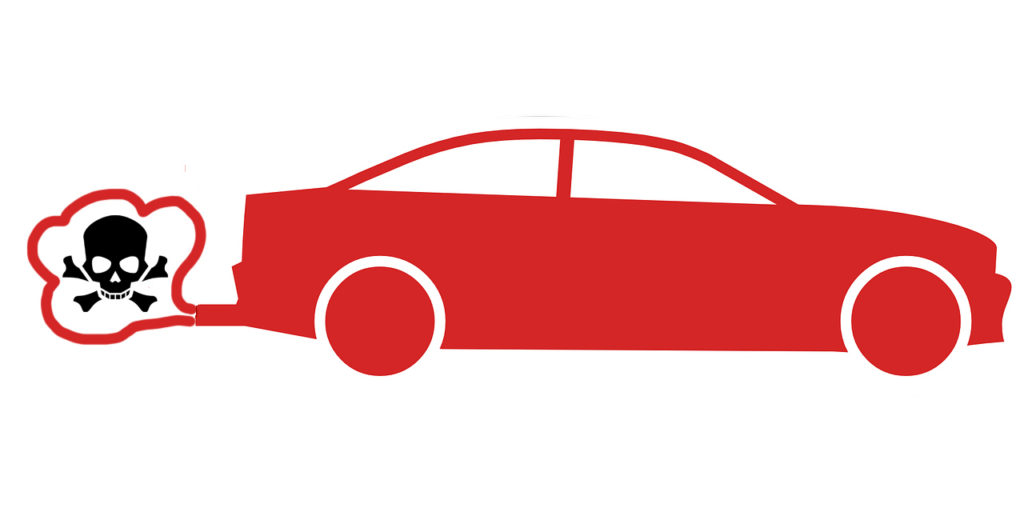No Idle Threat
Compiled by John DiCocco
Idling your car—leaving the engine running while the vehicle is parked or standing—is bad for your car, your wallet, your own health, and the environment.
One of the unfortunate inventions of the past few years is the auto ignition feature that allows owners to start their cars remotely (to “warm up the engine”), without having to step outside. With new car technology, it’s totally unnecessary. But beyond that, it’s dangerous, because it allows carbon monoxide to build up in your driveway, and may even seep into the car.
Everyday in the US, millions of cars and trucks idle needlessly, sometimes for hours, and an idling car can release as much pollution as a moving car. Even worse, the pollutants build up in a contained area, concentrating their toxicity.
Never idle in a garage
Never let a car idle in a garage, even with the garage door open. Carbon monoxide, remember, is odorless, tasteless, invisible—and deadly.
Idling for more than five minutes is illegal in Massachusetts.
Also, you might be surprised to learn, idling for more than five minutes is illegal in Massachusetts (Massachusetts General Laws, Chapter 90, Section 16A).
With newer cars, warming up an engine and warming up the car’s interior both work more efficiently once the car is moving. No one loves getting into a cold car. But we choose to live in New England, we have warm coats, and most cars today will warm up within two or three minutes, once they’re on the road.
There are numerous sources describing the problems with idling, and one of the most succinct and informative comes from Sustainable Belmont’s Cleaning the Air Campaign. Its webpage lists interesting myths and the facts that clarify them.
Sustainable Belmont members work with Belmont’s public works and police departments and the Belmont Public Schools on the Cleaning the Air Campaign.
For more information or to join the Cleaning the Air Campaign Working Group, please contact sustainablebelmont@gmail.com.
IDLING MYTHS AND REALITY
Myth: The engine should be warmed up before driving.
- Idling is not an effective way to warm up a vehicle—driving is.
- An engine is sufficiently warm after 30 seconds, even in winter.
Myth: Idling is good for your engine.
- Engines are designed to drive, not idle.
- Excessive idling can damage engine components including cylinders, spark plugs, and the exhaust system.
- Your engine is not working at peak operating temperature when it’s idling, so fuel does not go through complete combustion.
- Idling allows water to condense in the exhaust system causing corrosion and can reduce the life of the exhaust system.
Myth: Shutting off and restarting is hard on your engine and uses more fuel.
- More than 10 seconds of idling uses more fuel than restarting the engine.
- Frequent restarting has little impact on engine components
Myth: Idling for a few minutes doesn’t matter.
- Idling wastes fuel and money. Idling five minutes here and there throughout the day can add up to more than a gallon wasted in a day.
- Burning gasoline contributes to climate change gases. Every gallon of gas produces about 20 pounds of carbon dioxide when combusted.
- Vehicle idling contributes to air pollution at the local and community level.
- If you’re going to be parked for more than 10 seconds, turn off your engine.
Myth: I need to keep my car running to keep it warmed up in the winter.
- Cars only need 30 seconds of idling on a cold day before driving. Today’s modern engines warm up more quickly once a car is operating.
Examples of Wasteful Idling:
- While waiting for passengers
- In drive-through lanes at restaurants or banks
- Pulling over for a phone call (pulling over is good; leaving the car running is not)
- Running quick errands
- Stopping to talk to an acquaintance or friend
- Prestarting the car while preparing to leave the house
- Listening to the end of a song or story on the radio
Five Easy Ways to Reduce Idling
- TURN IT OFF. Turn off the engine if the vehicle is going to be parked for more than 10 seconds (except in traffic).
- DRIVE. Drive your vehicle to warm it up rather than idling (no more than 30 seconds is needed on winter days to circulate the oil through the engine).
- KEEP YOUR CAR WELL-TUNED. A poorly maintained car can release as much as 100 times the pollution of a well-maintained car.
- TRIP CHAIN. Combine multiple trips into one outing.
- SPREAD THE WORD. Tell a friend about how to keep an engine healthy, save money, reduce pollution, and never idle in the driveway—or anywhere else, if you can avoid it.
John DiCocco is the editor of Belmont Citizens Forum Newsletter.



Sorry, the comment form is closed at this time.